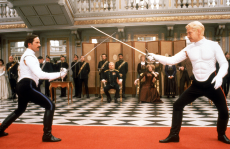
When discussing revenge as a motivational factor in the play Hamlet, the characters Laertes and Fortinbras must be considered. When Hamlet kills Polonius (Laertes’ father) through a curtain mistaking him for Claudius, Laertes vows to avenge his father by killing Hamlet. However, unlike Hamlet, Laertes is what the Danish Prince would consider a model revenger – completely focused and dedicated upon his role, embracing the bloodthirsty nature of revenge and not resting until he has completed his task. Indeed Laertes feels that if he does not revenge then he doesn’t deserve to be his father’s son; “That drop of blood that’s calm proclaims me bastard, cries cuckold to my father, brands the harlot even here, between the chaste unsmirched brows of my true mother." Laertes’ response to hearing of his father’s death is to immediately return home from France, gather a group of followers to take control of the palace, and only stop to think and ask questions once the palace is seized. In contrast to this, Hamlet prefers to assess the situation first and spends most of the play brooding over how best to exact revenge upon Claudius and fulfil his role as revenger. This is shown in the 1996 film adaptation of Hamlet, (directed by Keith Branagh who also stars as the young Prince) when he has the opportunity to stab Claudius through the head in a confession box but chooses not to because upon reflection he is concerned that to kill Claudius whilst in prayer "send [the villain] to heaven”. To kill him at that point would be “hire and salary, not revenge!" Hamlet’s religion in this case and his evil thinking hinder his opportunities to kill Claudius and truly revenge. Furthermore, for Hamlet to kill Claudius in cold blood would be considered treason and he a traitor to Denmark. It is only when Claudius is revealed by Laertes to have plotted to poison Hamlet in the final scene of the play that he feels justified in killing the openly guilty King. Therefore, it could be argued that revenge is a highly motivational factor in Hamlet, particularly for Laertes and Fortinbras, but for the protagonist in question, his innate desire to brood over his actions and simple lack of will to pick up a sword and kill Claudius for fear of consequences both religious and legal hinders its motivational impact.
Fortinbras loses his father and Norwegian territory when Old Hamlet defeats his father in a duel and so sets out to reclaim honour for his family and patriotic heritage. His character is very headstrong and, similarly to Laertes he will fight for little reason but for honour and acts swiftly as a revenger, a quality which Hamlet envies greatly. When Hamlet meets Fortinbras leading an army on Poland, he is awestruck and it could be argued that the meeting provides a sense of self realisation for Hamlet as he compares himself to the mighty Fortinbras; "To be great is not to stir without great argument but greatly to find quarrel in a straw when honour's at the stake."Therefore revenge appears less motivational for Hamlet than for Laertes and Fortinbras. Having said this, the fact that Hamlet admires the two ‘model revengers’ to the extent that he grants Fortinbras the Danish throne, suggests that revenge is still a powerful motivator for Hamlet and perhaps it is just his more ‘philosophical’ nature that leads him to bide his time in his revenge, which he does ultimately eventually achieve, rather contradictively acting upon his opportunist nature and killing the guilitily exposed Claudius though at great cost. Laertes and Fortinbras strongly contribute to the idea of revenge as a motivating theme in the play.
In light of the arguments expressed, I think revenge is vital to the play as a motivating theme and lays the foundations for the tragedy. Hamlet is a very unpredictable character; he seems to have an innate desire to brood over actions and yet on other occasions he is an opportunist acting often rashly and foolishly such as when he ‘accidentally’ murders Polonius, stabbing wildly through the curtain in his panic and acting upon the possibility that the cry from behind the curtain is Claudius. However, at other times his opportunistic nature serves him to good effect such as in the dramatic final scene of the play, Act 5 Scene 5, in which (in the 1996 film adaptation) Hamlet traps Claudius with a chandelier and forces him to drink from the poisoned goblet. Revenge motivates Hamlet to extreme opportunistic actions and without that motivation he may not have been able to revenge his father’s death and remove Claudius from the Danish throne. There are other key themes in the play such as madness and Hamlet’s unhealthy obsession with his mother’s sexual life which greatly hinders his progress as a revenger seen in Hamlet’s soliloquy when he questions his motives and in the famous “To be or not to be” speech considers the worth of his own life! The fact that he says “incestuous, murderous” emphasises the importance of Claudius’ crimes in Hamlet’s mind; that his sin of marrying Gertrude and making love to her is worse than the act of murdering his own brother and Hamlet’s father, the old king. However, even considering theses key themes, the characters of Laertes and especially Fortinbras have such an impact on Hamlet as revenger role models that the motivating theme of revenge which ultimately leads a young academic to commit multiple murders must surely be considered the prominent and most important motivational theme in Shakespeare’s play- Hamlet.

0 Comment:
Be the first one to comment on this article.